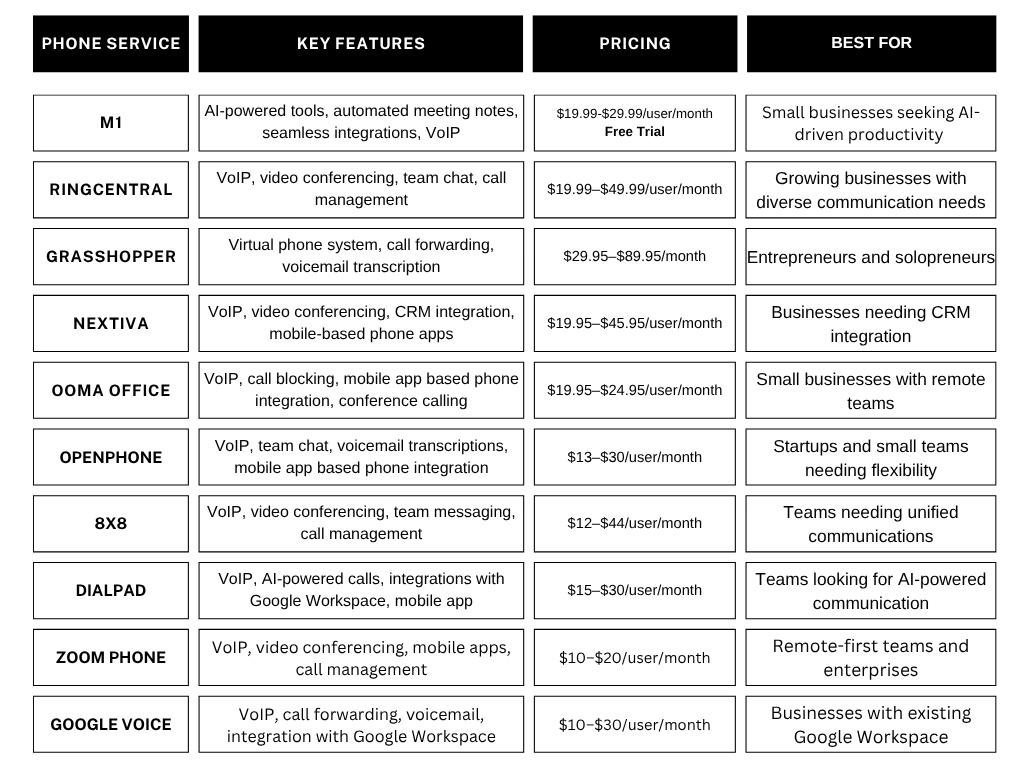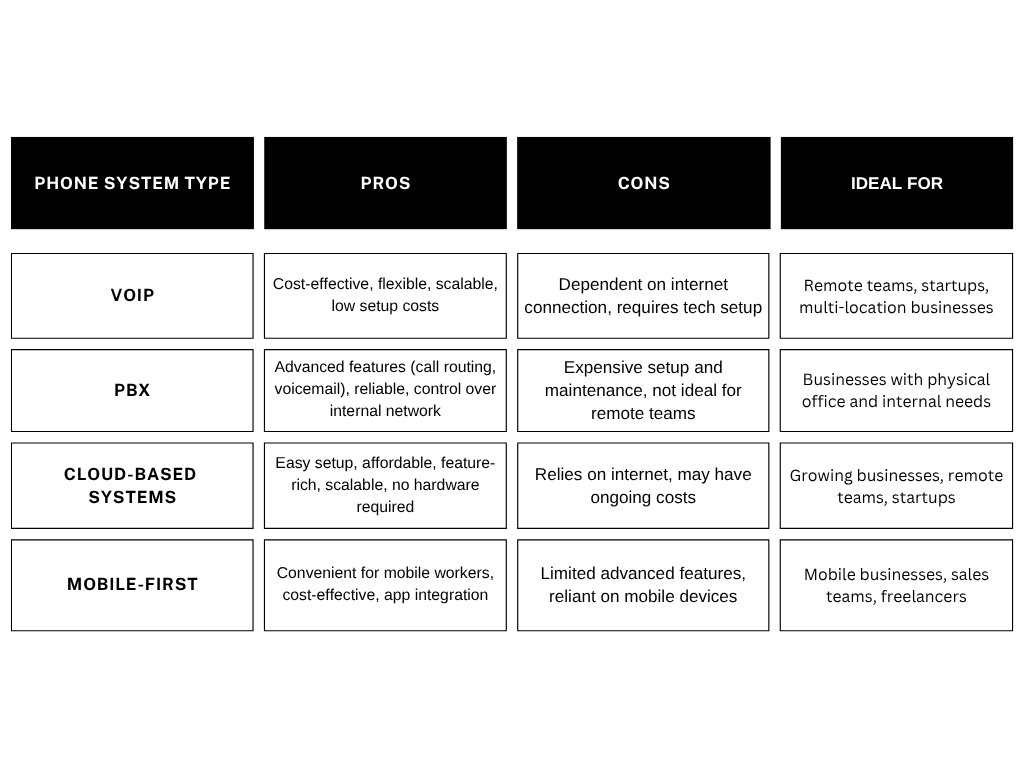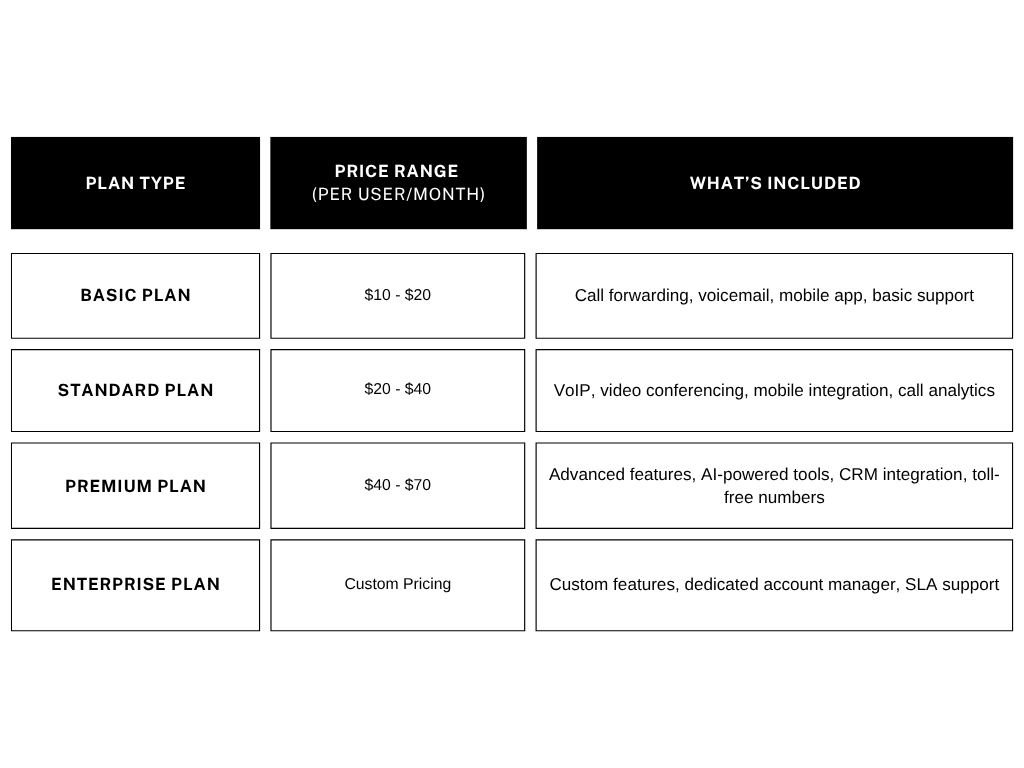If you're a small business owner, choosing the right phone system is a critical element of your communication strategy. A reliable business phone service enhances how you connect with clients, collaborate with your team, and manage operations. Conversely, the wrong choice can result in inefficiencies, missed opportunities, and frustrated customers.
With a flood of options available, finding the perfect fit might feel overwhelming. That’s why we’ve researched for you. In this guide, we’ll spotlight the 10 best business phone services for small businesses in 2025, breaking them down based on cost, functionality, scalability, and user-friendliness. Let’s explore how the right business phone service can elevate your business.
Why Do You Need a Business Phone Service?
In 2025, relying on personal phone lines, landlines, or free tools for business communication is outdated and inefficient. A dedicated business phone system isn’t just about making calls—it’s about presenting a professional image, enhancing collaboration, and ensuring your business runs smoothly.
Key Benefits of a Business Phone Service
Improved Customer Communication: Features like call routing ensure that incoming calls reach the right person, even during peak hours.
Professionalism and Trust: A separate business system and phone number projects credibility and keeps personal and business communication distinct, making your brand appear more trustworthy.
Enhanced Team Collaboration: Modern business phone systems include tools like group calls, shared voicemail, and instant messaging, keeping your team connected—whether they're in the office or remote.
The Statistics Don’t Lie
Did you know?
- Nearly 60% of small businesses report that a dedicated phone system improves customer satisfaction.
- Businesses with professional systems experience 30% faster response times than those relying on personal lines or free tools.
As communication becomes more critical, you need a reliable and scalable business phone system.
5 Phone Features Every Small Business Needs
Choosing the right business phone system means focusing on features that meet your communication needs and support your business growth. Here are the top five features to prioritize for a small business phone:
1. VoIP (Voice over Internet Protocol)
VoIP phone systems enable cost-effective and flexible communication by transmitting calls over the internet.
- Cost-effective: Lower installation and maintenance costs compared to traditional lines.
- Scalability: Easily accommodates business growth without requiring extensive infrastructure upgrades.
- Flexibility: Supports remote work by enabling employees to communicate from anywhere.
Example: A marketing agency uses a VoIP provider to allow team members to work from home while staying reachable by clients.
2. Call Forwarding
Call forwarding ensures no incoming call falls through the cracks, regardless of location or time.
- Better customer experience: Calls are routed to the appropriate person, even during busy hours.
- Business continuity: Forward calls to mobile devices, voicemail, or other employees during absences.
Example: A consulting firm utilizes call forwarding to connect even international calls with the right consultant, no matter the time zone.
3. Mobile App Integration
For businesses with hybrid or remote teams, mobile app-based phone systems are game-changers, enabling employees to access the system on their smartphones or tablets.
- On-the-go functionality: Take calls, send texts, and manage voicemail from anywhere.
- Unified communication: Consolidate business communications in one app for efficiency.
Example: An e-commerce business leverages mobile app-based phone system integration to provide real-time customer support while attending trade shows.
4. Scalability
Your business phone system should grow with your business.
- Future-proofing: Add new lines or features as your business expands.
- Cost-effectiveness: Pay for what you need now, with the option to scale later.
Example: A startup begins with basic features and gradually adds video conferencing and collaboration tools as the team grows.
5. Reliable Customer Support
Having access to 24/7 customer support ensures minimal disruptions to your business.
- Around-the-clock availability: Crucial for businesses operating across time zones.
- Multi-channel support: Get assistance through phone, email, or live chat.
Example: A law firm depends on 24/7 support to maintain uninterrupted client communication, particularly during high-stakes cases.
With these five features—VoIP, call forwarding, mobile or app-based phone system integration, scalability, and customer support—you’re better equipped to choose a business phone system that enhances communication, supports growth, and keeps your business competitive.
10 Best Business Phone Services
Here are the 10 best business phone systems, with a breakdown of each service to help you find the perfect fit.
Comparison Chart

1. M1
M1 is an AI-powered business phone service designed to enhance productivity and streamline communication. With AI-driven features like automated meeting notes and daily summaries, M1 goes beyond traditional business phone systems by integrating with popular business tools.
- Key Features: AI-powered meeting notes, automated transcripts, team collaboration tools, and integrations with key business platforms.
- Pricing: Starts at $19.99/user/month, with a free trial available.
- Best For: Small businesses seeking AI-driven productivity tools and easy integrations.
2. RingCentral
A leader in cloud-based phone services, RingCentral offers an all-in-one communication platform for small businesses. With features like VoIP, video conferencing, and team messaging, it’s perfect for growing businesses that need a versatile communication tool.
- Key Features: VoIP, video conferencing, team chat, call management, mobile apps, integrations with CRM, and productivity tools.
- Pricing: Starts at $19.99 per user/month, with additional features available in higher tiers.
- Best For: Businesses needing scalable, multifunctional communication solutions.
3. Grasshopper
Grasshopper provides a virtual phone system tailored for solopreneurs and small businesses. It enables you to establish a professional presence with features like call forwarding and voicemail transcription—all without requiring a physical office.
- Key Features: Virtual phone numbers, call forwarding, voicemail transcription, call screening, mobile app integration.
- Pricing: $29.95–$89.95 per month, depending on the number of users and features.
- Best For: Entrepreneurs and small teams seeking an affordable solution for professional call handling.
4. Nextiva
Nextiva combines VoIP, video conferencing, and CRM integrations into a user-friendly business phone system. With advanced features and team collaboration tools, Nextiva is a great choice for businesses aiming for an all-in-one communication solution.
- Key Features: VoIP, video conferencing, mobile apps, CRM integration, team collaboration tools.
- Pricing: Starts at $19.95 per user/month.
- Best For: Businesses wanting to integrate customer relationship management with communication tools.
5. Ooma Office
Ooma Office is known for its cost-effective VoIP services and exceptional customer support. It offers features like call blocking, mobile app integration, and conference calling, making it ideal for small businesses with remote teams or international clients.
- Key Features: VoIP, call blocking, mobile app, conference calling, call forwarding.
- Pricing: Starts at $19.95 per user/month.
- Best For: Small businesses focusing on conference calls and international calling.
6. OpenPhone
OpenPhone is a cloud-based phone system designed for startups and small businesses. With features like VoIP, team messaging, and voicemail transcription, it provides flexibility and ease of use for modern business communication.
- Key Features: VoIP, team chat, voicemail transcription, mobile app integration.
- Pricing: $13–$30 per user/month.
- Best For: Startups and small teams needing an affordable, user-friendly communication tool.
7. 8x8
8x8 is a robust cloud-based phone system that unifies VoIP, team messaging, video conferencing, and call management. Its affordable plans cater to businesses of all sizes, especially those with remote or dispersed teams.
- Key Features: VoIP, video conferencing, team chat, call management, mobile app integration.
- Pricing: Starts at $12 per user/month.
- Best For: Teams looking for a comprehensive communication platform with voice and video capabilities.
8. Dialpad
Dialpad is an AI-powered business phone system designed to integrate seamlessly with Google Workspace. It offers VoIP services along with features like voice recognition and AI-powered call analytics, providing a more intelligent communication experience.
- Key Features: VoIP, AI-powered calls, integrations with Google Workspace, mobile apps, and team messaging.
- Pricing: $15–$30 per user/month.
- Best For: Teams looking for AI-powered communication solutions that integrate effortlessly with Google tools.
9. Zoom Phone
Known for its video conferencing platform, Zoom also provides a robust business phone service. Zoom Phone combines VoIP with call management and mobile app integration, making it a great choice for remote-first teams.
- Key Features: VoIP, video conferencing, mobile apps, call management.
- Pricing: $10–$20 per user/month.
- Best For: Remote-first teams and enterprises needing a cost-effective communication tool.
10. Google Voice
Google Voice is a straightforward and affordable VoIP solution that integrates perfectly with Google Workspace. It offers basic call management features and is ideal for small businesses already using Google’s productivity tools.
- Key Features: VoIP, call forwarding, voicemail, integration with Google Workspace.
- Pricing: $10–$30 per user/month.
- Best For: Businesses with existing Google Workspace accounts seeking a simple phone system.
Types of Small Business Phone Services
Choosing the right business phone system for you requires understanding the different options available. Each phone system has unique features, benefits, and limitations, so it’s important to pick the one that fits your business size and communication goals. Here’s a breakdown of the main types of phone systems for small businesses:
Comparison Chart: Types of Small Business Phone Systems
When choosing the right phone system for your small business, consider your needs, location, and future growth.

How to Choose the Right Small Business Phone Service
Choosing the right phone system is essential for your small business. With so many providers offering various features, you need to evaluate your needs and select the phone system that delivers the most value. Here’s how to make an informed choice:
1. Identify Your Key Needs
Define your company’s communication requirements before exploring options. Consider:
- Call volume: Do you expect high or low call traffic? International calls?
- Team size: A solo entrepreneur or small team may need a simple business phone system, while a larger or growing team requires a scalable system.
- Integration: Does your business use CRM systems or other tools that require integration?
- Budget: Some services may offer high-end features but come at a premium price.
2. Consider Scalability
As your business grows, your communication needs will likely expand. Choose a business phone system that scales easily. Look for:
- User upgrades: Can you add users as your team grows?
- Advanced features: Are features like call analytics or automated attendants offered?
3. Evaluate Customer Support
Even the best systems experience technical issues. Choose a small business phone provider with reliable support. Consider:
- Availability: Is support available 24/7 or only during business hours?
- Support channels: Can you reach support via live chat, email, or phone?
- Response time: Does the provider respond quickly in emergencies?
4. Think About Mobile and Remote Capabilities
For businesses with remote or hybrid teams, virtual phone and mobile capabilities are crucial. Ensure the service offers:
- Mobile apps: Can employees manage calls and voicemail from their smartphones?
- Call forwarding: Can calls be forwarded to mobile devices or home offices?
- Video conferencing: Is video conferencing integrated or does it require a separate platform?
Before committing, check customer reviews for feedback. Many providers offer free trials, so take advantage of this to test the service and ensure it meets your needs.
How Much Should You Pay for a Small Business Phone Plan?
Understanding pricing structures helps you find a solution that fits both your needs and budget. Here’s a breakdown of typical pricing ranges, tiers, and potential hidden costs.
Typical Pricing Ranges
Small business phone plans typically use one of two pricing models: per-user or tiered pricing. In both cases, the price depends on the features and capabilities you select.
- Per-user pricing: Common for cloud-based or VoIP services. You pay a fixed rate per user (employee).
- Tiered pricing: You pay based on the number of users and features.
Typical Price Ranges by Plan Type

Hidden Costs and Extra Fees
Even with transparent pricing, some hidden costs may arise. Watch out for:
- Setup Fees: Some providers charge $10 to $100 to configure your system.
- Add-On Features: Features like call recording, advanced analytics, or extra phone numbers may cost more.
- Long-Term Contracts: Some providers offer discounts for long-term contracts, but if you need flexibility, consider a monthly plan.
- Overage Charges: Check for limits on calls, especially international calls, and monitor your usage to avoid extra charges.
- International Call Fees: Make sure your plan covers global calling or check international call rates before committing.
Tips for Getting the Best Value
- Look for Bundles: Some providers offer bundled pricing for multiple services, saving you money while streamlining your tools.
- Take Advantage of Free Trials: Test the service without committing to a long-term contract by using free trials.
- Check for Discounts: Providers often offer discounts for annual subscriptions or seasonal promotions.
Get Your Small Business Phone Started with M1
Choosing the right phone system for your business is simple with M1’s flexible, cost-effective plans. Whether you're just starting or growing fast, M1 makes it easy to scale and streamline your communication.
Choose the Plan That Fits Your Business
M1 offers customizable plans for businesses of all sizes:
- Small Businesses Phone: Affordable entry-level plans with basic call management, voicemail, and mobile integration. Add features as you grow.
- Growing Teams: Scalable plans for expanding teams, with enhanced call routing and CRM integrations.
- Enterprises: Advanced features like call analytics, AI-powered voicemail transcription, and team collaboration tools.
Sign Up and Customize Your Plan
Starting with M1 is fast and easy:
- Sign Up: Visit M1’s website to select your plan. The process is quick, secure, and takes just minutes.
- Customize Your System: Set up your small business phone system with local or toll-free numbers, call forwarding, voicemail preferences, and more.
- Add Team Members: Easily assign numbers to team members or set up shared extensions for better collaboration.
Set Up Your Phone System Quickly
M1’s cloud-based platform lets you get started in just a few clicks:
- Cloud Flexibility: No expensive hardware needed. Download the M1 app on your iOS mobile device to start making calls.
- Manage Calls Anywhere: The mobile app lets you answer calls, use call recording check voicemails, and send messages from anywhere.
- User-Friendly Dashboard: Access call settings, analytics, and system customization all from one easy-to-use dashboard.
Access Powerful Business Features
M1 offers features that help your business run smoothly:
- Automated Call Management: Direct calls to the right department or individual with intelligent call routing.
- Voicemail Transcriptions: Receive transcribed voicemails via email for easy reading on the go.
- Integrated Collaboration Tools: Manage communication and projects through integrations.
- High-Quality Calling: Enjoy crystal-clear calls with M1’s advanced VoIP technology.
Access Ongoing Support
M1 prioritizes customer support with 24/7 availability:
- Help Center: Access guides, FAQs, and troubleshooting tips online.
- Live Support: Reach M1’s team via chat, phone, or email for personalized assistance.
- Dedicated Account Managers: Enterprises receive a dedicated account manager for custom configurations and ongoing support.
Enjoy Flexible Pricing
M1 offers transparent, flexible pricing with no hidden fees:
- No Contracts: Enjoy month-to-month plans without long-term commitments.
- Affordable Plans: Pay only for what you need, with no unnecessary costs.
M1 makes it easy to set up a business phone system that fits your needs, scales as you grow, and offers reliable, cloud-based communication. Get started today with our free trial and enjoy seamless, hassle-free communication.
Try M1 Free for 7 Days
FAQ
What Are Examples of Business Phone Systems?
Business phone systems include cloud-based solutions like RingCentral, Grasshopper, and Ooma, as well as traditional PBX systems. Modern business phone services often feature VoIP phone services, auto attendants, call recording, and integrations for video meetings and team chat.
What Are Office Phone Systems Called?
Office phone systems are commonly referred to as small business phone systems. These can include PBX systems, VoIP providers, and virtual phone systems, all designed to handle incoming calls, texting, and voice communications efficiently.
Is RingCentral Good for Small Businesses?
Yes, RingCentral is an excellent small business phone. It offers a unified communications platform with VoIP services, team chat, video meetings, and integrations tailored to small business needs.
Is VoIP a Good Idea for Small Businesses?
Absolutely. A VoIP phone system is cost-effective, scalable, and flexible. It eliminates the need for traditional landlines and provides features like international calling, auto attendants, and call recording.
How Do I Choose a Small Business Phone System?
Consider your business needs, such as the number of phone lines, support for toll-free numbers, and whether you need a virtual phone system or desk phones. Popular providers like Grasshopper, GoTo Connect, and Zoom Phone cater to different requirements.
What Does a Business Phone System Do?
A business phone system manages incoming calls, facilitates team chat and voice communication, and supports features like call forwarding, fax, and integrations with other tools. Many modern systems also include PBX functionality and video meetings.
How Much Does a Virtual Phone System Cost?
Costs vary by provider, but virtual phone systems typically range from $12 to $50 per user/month. For example, Ooma starts at $19.95/month, while Grasshopper ranges from $29.95–$89.95/month.
How Do I Create a Free Phone Line for My Business?
Some VoIP providers, like Google Voice, offer free virtual phone numbers with basic features like texting and voice calls. However, upgrading to a business phone service provides more professional options like auto attendants and call recording.
Do Businesses Still Use Landlines?
While some businesses still use landlines, most are transitioning to VoIP phone systems for flexibility, lower costs, and features like unified communications and international calling.
Do Companies Still Use PBX Systems?
Yes, but many companies now rely on cloud-based PBX systems, which offer the same functionality—like managing multiple phone lines and call routing—with the added benefits of mobility and scalability.

.svg)